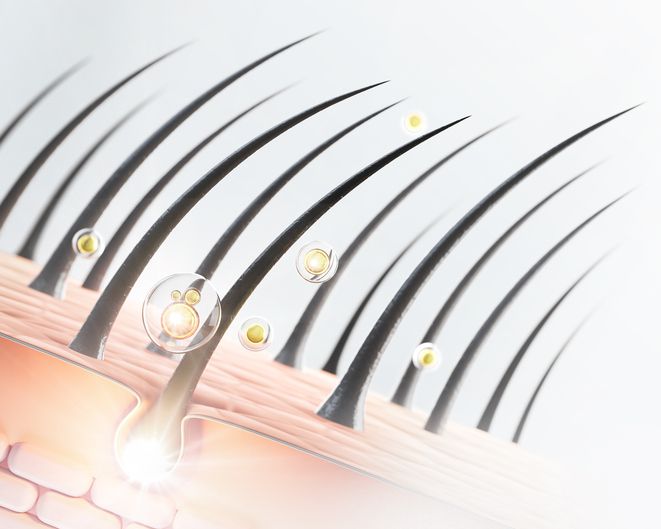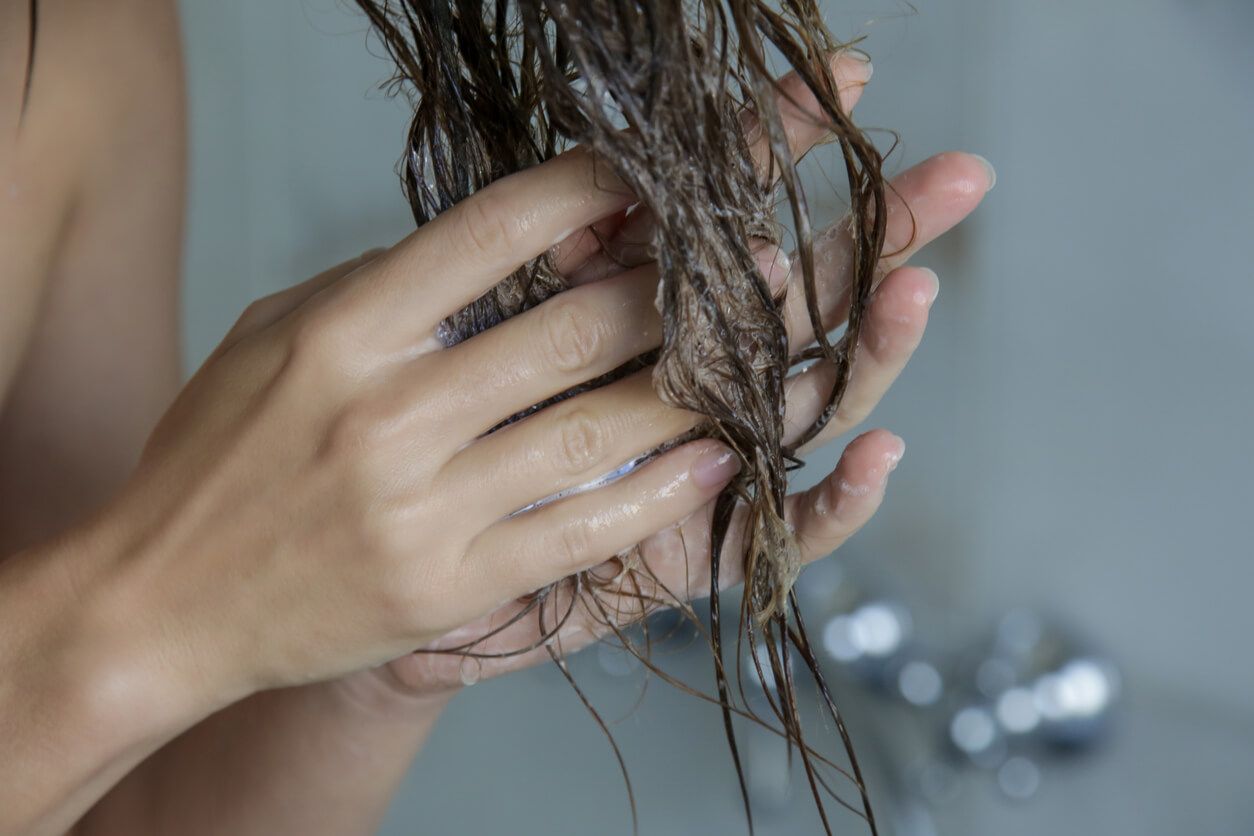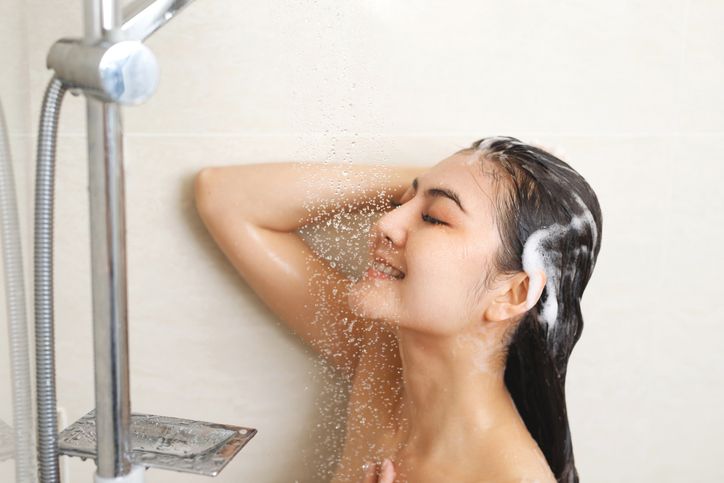
- Home
- Trend
- Weight Loss Strategies
- Acne Tips
- Hair Health Information
- Blemish Removal Tips
- Acne Scar Removal Tips
- Muscle Building Techniques
- Intimate Care Tips
- Postpartum Intimate Care
- Eye Bags Wiki
- Tips for Face Slimming
- Secret of Permanent Hair Removal
- Breast Enlargement Tips
- Cure to Snoring
- Marionette Lines
- Skin-Tightening Secrets
Scalp care is just as important as hair care. To have strong hair, you must first have a healthy scalp. The steps for scalp maintenance are simple. By following these 4 easy home scalp care steps, you can easily prevent hair loss!
1. Why Should You Do Scalp Care?

Scalp care is a crucial step that many women overlook, focusing mainly on the health of their hair but neglecting the necessary care for their scalp. Your scalp is like soil: if it's loose and lacking nutrients, plants can’t thrive. Similarly, to have healthy hair, you must care for your scalp to prevent aging and hair loss.
Your scalp, like your face, has numerous fine pores and secretes oil to nourish both your scalp and hair. However, if the oil production is excessive, it can block the pores, leading to scalp inflammation, dandruff, hair loss, and even premature aging of the scalp. Healthy scalp care is the foundation of healthy hair—ladies, have you started taking care of your scalp yet?
2. How Can You Tell If Your Scalp Is Healthy? These 4 Signs Could Indicate Scalp Inflammation!

To have a healthy scalp, it’s not just about what’s “said”; you need to pay attention to the following 4 points to know if your scalp is healthy or showing signs of aging:
1. Excessive Scalp Oil
Oily scalp is a clear indicator of scalp health. If your scalp’s oil production increases quickly in a short period, and your scalp and hair feel greasy, this can lead to clogged hair follicles, causing oxygen deprivation in hair follicles, leading to bacteria growth, and ultimately hair loss.
2. Dry and Brittle Hair
The condition of your hair reflects whether your scalp is providing sufficient nutrients. If your hair is dry, prone to breakage, lacks shine, and thinning, it indicates that your scalp is lacking moisture and nutrients, making your hair weak and damaged. You need to care for your scalp to prevent further aging.
1. Itchy Scalp
Are you scratching your head because of worry or because your scalp itches? While scalp itchiness is common, if it becomes more than usual and starts affecting your daily life, it may indicate an issue with your scalp health! Continuing to scratch can damage the scalp, worsening inflammation, and could increase hair loss.
2. Increased Dandruff
Dandruff can be a major nuisance and affect your appearance. Everyone has a small amount of dandruff, as it’s a sign of scalp renewal. However, if dandruff becomes noticeable between your hair strands, it could be a sign of serious scalp issues such as seborrheic dermatitis.
免費體驗
F8 Hair Regrowth Treatment
1 Minute Self-Registration
Date should not be before minimal date
3. Scalp Care According to Scalp Type: Dry Scalp vs Oily Scalp
Scalp care should never be taken lightly, and different scalp types require different care. Using the wrong products or methods can damage your scalp health.
Dry Scalp
1. Avoid Anti-Dandruff Shampoos
Anti-dandruff shampoos or deep cleansing shampoos often have strong cleansing power. If used frequently on dry scalp, they can strip away natural oils, leading to dryness and making the hair brittle and unhealthy.
2. Avoid Over-Washing
While some people wash their hair multiple times a day, this may not be advisable for those with dry scalps. Over-washing can deprive the scalp of the necessary oils, causing the scalp to produce even more oil, leading to an oily appearance.
2. Use Lukewarm Water Hot water can strip away oils from the scalp. A proper amount of oil is essential to keep the scalp moisturized and reduce issues like itchiness and dandruff. Avoid using hot water, as it can irritate the scalp and wash away essential oils.
Oily Scalp
1. Limit Fatty Food Intake
The main issue with oily scalp is excessive oil secretion. Eating less fatty, spicy, and stimulating foods can help reduce oil production and prevent oily scalp, much like how reducing face oil production helps.
2. Use Conditioner Correctly
Even oily scalps can benefit from conditioner, but it should be used carefully. Apply conditioner an inch away from your scalp to avoid clogging pores while still nourishing your hair.
4. Start Your Scalp Care Now! Avoid These Mistakes While Washing Your Hair!
The first step in scalp care is proper cleansing! We wash our hair daily, but are we all doing it correctly? Here are 5 common shampoo mistakes that can harm your scalp and lead to hair loss over time. Avoid these to keep your scalp healthy!
1. Scratching the Scalp with Your Nails
It’s common to scratch your scalp when it itches, but using your nails can damage your scalp. Instead, gently massage the itchy areas with your fingertips to avoid scratching and damaging the scalp.
2. Directly Applying Shampoo to the Scalp
Do you apply shampoo directly to your scalp when pouring it out? If so, it’s time to break this habit! Most shampoos are highly concentrated when first dispensed, which can irritate the scalp and clog hair follicles. The proper way is to lather the shampoo in your hands first, then apply it to your hair and scalp.
1. Not Drying Your Hair
Many believe that blow-drying with hot air damages hair, but failing to dry your hair properly can cause more harm. Leaving your scalp wet for too long in a warm, damp environment encourages bacterial growth, which can worsen itchiness and dandruff.
2. Not Detangling Your Hair Before Shampooing
How many of you detangle your hair before washing it? Wet hair is more prone to tangling, and trying to detangle it while it’s still wet can put strain on the scalp. Detangling before washing can prevent scalp damage and ensure better cleansing.
3. Using the Wrong Shampoo Having the right shampoo is as important as using the right tools for a task. Choosing a shampoo that’s unsuitable for your hair type can lead to dryness, oiliness, or more dandruff. Make sure to choose the right one based on your scalp condition.
5. How to Choose the Right Shampoo?
Given that everyone has different scalp care needs, how do you choose the right shampoo? Simply judging a shampoo by its label is not enough. Here are 3 factors to consider when selecting hair and scalp care shampoos:
1. Medicated vs Non-Medicated Shampoos Some shampoos, especially those from Japanese brands, are labeled “medicated,” indicating they contain special ingredients designed to target scalp issues such as dandruff, dryness, excess oil, and itchiness. Medicated shampoos contain specific medical ingredients and are best suited for those with scalp problems. Non-medicated shampoos are basic shampoos without these ingredients and are safe for everyday use.
2. Check Ingredients and Concentration When choosing a shampoo, check both the active and harmful ingredients. Active ingredients like Thymol can help reduce scalp odor and prevent bacteria; Piroctone Olamine is effective against dandruff caused by fungi, while Dipotassium Glycyrrhizate can reduce scalp itching from inflammation. Harmful ingredients, such as Dimethicone, artificial fragrances, and Sodium Lauryl Sulfate (SLS), can clog pores and damage the scalp over time.
3. Choose a Product with Good Cost-to-Performance Ratio While ingredients are important, price should also be considered. Since shampoo is used daily, it can add up over time. Choose a shampoo with a good balance of quality and cost, especially if it contains scalp care ingredients.
免費體驗
F8 Hair Regrowth Treatment
1 Minute Self-Registration
Date should not be before minimal date
6. 4 Easy Scalp Care Tips to Try at Home!
Many hair centers offer scalp care treatments, but they can be expensive. You don’t need to go to a salon to take care of your scalp! Here are 4 simple steps you can do at home to keep your scalp healthy:
Step 1: Deep Cleanse the Scalp
The first step in scalp care is deep cleansing. This removes dead skin cells and clears the hair follicles to allow hair care products to penetrate the scalp effectively.
Step 2: Wash Your Hair Correctly
After deep cleansing, wash your hair properly. Applying shampoo directly to the scalp or scrubbing too hard can damage your scalp and hair.
Step 3: Use the Right Hair and Scalp Care Products
Use hair care products that are designed specifically for the scalp, such as scalp serums or conditioners, to nourish the scalp without clogging hair follicles.
Step 4: Scalp Massage
Finish your scalp care routine with a gentle massage. Massaging promotes blood circulation to the scalp, which helps with hair growth and strengthens hair strands.
7. Expert-Recommended Scalp Care Treatment: Perfect Medical F8 Hair Regrowth Treatment
If you’re looking for scalp care but don’t have the time to do it yourself at home, consider the F8 Hair Regrowth Treatment, which uses medical-grade laser technology to penetrate the scalp layers and balance oil secretion. This promotes blood circulation, ensuring hair follicles receive proper nutrients for health.
The F8 treatment can help improve blocked hair follicles and fragile hair roots, leading to stronger, thicker hair. It restores scalp health with laser technology combined with premium scalp care serums.
Book Today: Perfect Medical F8 Hair Regrowth Treatment免費體驗
F8 Hair Regrowth Treatment
1 Minute Self-Registration
Date should not be before minimal date
FAQ

What scalp issues can excess oil cause?
Excess oil on the scalp can lead to follicle blockages, bacteria growth, and eventually hair loss. It can also cause itching and dandruff, which might signal seborrheic dermatitis.
How often should I deep clean my scalp?
Dry scalps should deep clean once every 1-2 weeks, while oily scalps can benefit from weekly deep cleansing.
What’s the proper way to wash my hair?
Lather shampoo in your hands first, then apply it to your scalp, and gently massage for 2-3 minutes before rinsing with warm water.
What’s the difference between medicated and non-medicated shampoo?
Medicated shampoos contain special ingredients to address scalp issues, while non-medicated ones are gentler and suitable for regular use.
What are the benefits of scalp massage?
Scalp massage promotes blood circulation to the scalp, which can speed up hair growth and strengthen hair strands.








